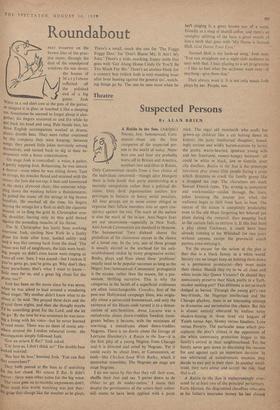Roundabout
FEET STAMPED on the brown lino of the prac- tice room; through the dust of the soundproof windows the sun shone,
the houses of Marylebone reflected off the polished
end of a biguitar. Josh
White in a red shirt tore at the guts of the guitar; or slapped it in glee; or touched it like a sleeping eat. Sometimes he seemed to forget about it alto- gether; his fingers scuttered to and fro while he put back his head and sang. Pale beside him, his three English accompanists worked at drums, Piano. double bass. They were rather overawed by the company they were keeping; between songs, they passed little jokes nervously among themselves, and turned back to dig at their in- struments with a fierce concentration.
On stage Josh is controlled : a voice, a guitar, a gently tapping foot. Rehearsing, he was almost a dancer—even when he was sitting down. Taut as strings, his muscles flexed and strained with the music; the foot did not tap, it beat and hammered at the shaky plywood chair; like someone whip- Ping down the washing before a thunderstorm, he pulled the music off the strings in big brown handfuls. He smoked all the time, his fingers leaving the strings for a flash to shift the cigarette around, or to fling the gold St. Christopher over his shoulder, leaving only its thin gold thread against the pounding muscles of his throat.
The St. Christopher has lately been working overtime. Josh, circling New York in a faulty Plane for hour after hour, landed safely--and Said it was like coming back from the dead. 'The house was full of neighbours, the kids were bawl- ing. people we didn't even know were ringing us from all over. Sure, I was scared—but I reckon if You've gotta go, you've gotta go. Why don't they have parachutes, that's what I want to know— little ones for us, and a great big chute for the Plane, too?'
Josh has been on the move since he was seven, When he was asked to lead around a wandering blind singer. 'My mother didn't know what to do about it,' he said. 'She prayed three days and she Prayed three nights, and then she thought maybe
I'd be something great for the Lord, and she let nle go.' By the time he was seventeen he was earn- ing a living with his voice—but he never learned to read music. There was no sheet of music any- Where around the London rehearsal room: the accompanists simply followed Josh.
'Got an octave E flat?' Josh asked.
'Cor love us, I don't think so!' The double bass looked worried.
'Baa boo ba boo,' boomed Josh. 'You can find that somewhere?'
They both peered at the bass as if searching for the lost chord. No octave E flat. It didn't
chatter: there were other notes for the big voice. The voice goes on to records; expressions don't. What made him worth watching was just that: the grins that change like the weather as he plays.
There's a small, mock shy one for 'The Foggy Foggy Doo,' for 'Don't Blame Me, It Ain't My Joke.' There's a wide, mocking, happy smile that goes with 'Get Along Home Cindy Or You'll Be Too Much For Me.' There's an aimless blank for a country boy (which Josh is not) standing hour after hour leaning against the general sto', watch- ing things go by. The one he uses most when he isn't singing is a great brown sun of a smile, friendly as a mug of shared coffee; and there's an almighty splitting of the face, a great mouth of lion's teeth that goes with 'My Name is Samuel Hall, God Damn Your Eyes.'
'Samuel Hall is my hush-up song,' Josh says. 'You can straighten out a night-club audience so easy with that. I hate playing to a set programme —I like to feel what the audience want next—if anything—give them that.'
They always want it. It is not only music Josh plays by ear. People, too.


































 Previous page
Previous page